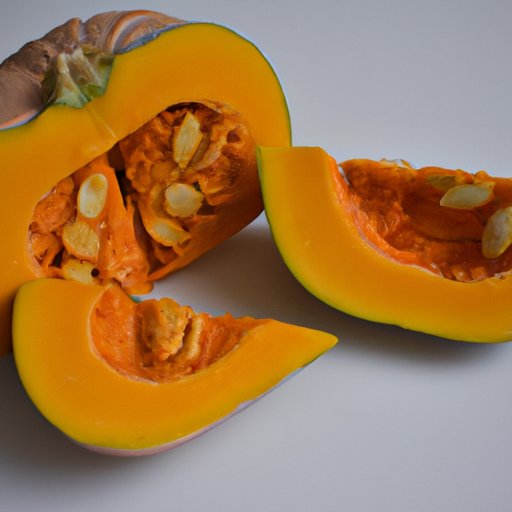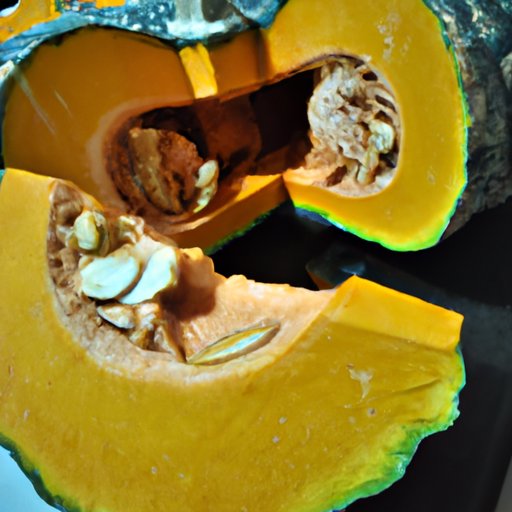Introduction
Pumpkin is one of the most popular vegetables in the world. It’s versatile, delicious, and packed with essential vitamins and minerals. But what exactly makes pumpkin so healthy? In this article, we’ll explore the nutritional benefits of pumpkin and explain why it’s such a great addition to any diet.

Exploring the Nutritional Benefits of Pumpkin
Pumpkins are rich in vitamins and minerals, including vitamin A, vitamin C, potassium, magnesium, iron, and calcium. They also contain fiber and antioxidants, which can help protect against disease. According to a study published in the journal Food Chemistry, pumpkins are an excellent source of carotenoids, phenolic acids, and flavonoids, all of which have been linked to improved health.
But how much pumpkin should you eat? The American Heart Association recommends that adults consume at least four servings of vegetables per day. One serving of pumpkin is equivalent to one cup of cooked or pureed pumpkin. This amount provides between 80 and 100 calories, depending on the type of pumpkin.

Health Benefits of Eating Pumpkin
Eating pumpkin can provide numerous health benefits. Here are some of the ways that pumpkin can improve your health:
Improving Digestion
Pumpkin is high in fiber, which helps to keep your digestive system running smoothly. Fiber helps to add bulk to your stool, making it easier to pass through your intestines. Additionally, fiber helps to slow down digestion, which can help you feel full for longer.
Enhancing Immune System
Pumpkin is also high in vitamin C, which is essential for a healthy immune system. Vitamin C helps to boost your body’s natural defenses against infection and disease. Additionally, pumpkin contains beta-carotene, which can help to protect your cells from damage caused by free radicals.
Lowering Cholesterol
Pumpkin is a good source of soluble fiber, which has been shown to reduce cholesterol levels. Soluble fiber binds to bile acids in the digestive tract, preventing them from being absorbed into the bloodstream. This reduces the amount of cholesterol circulating in the body, which can help to lower overall cholesterol levels.
Boosting Heart Health
Pumpkin is also high in potassium, which is an important nutrient for maintaining a healthy heart. Potassium helps to regulate blood pressure and can reduce the risk of stroke and heart attack. Additionally, pumpkin is low in sodium, which can also help to reduce the risk of heart disease.
How to Incorporate More Pumpkin into Your Diet
If you want to get more pumpkin into your diet, there are plenty of easy ways to do it. Here are a few ideas:
Using Pumpkin in Smoothies
Pumpkin puree can be added to smoothies for a nutritious and delicious breakfast or snack. Try blending it with yogurt, nut butter, banana, and a touch of honey for a tasty treat.
Adding Pumpkin to Salads
Diced or cubed fresh pumpkin can be added to salads for an extra boost of nutrition. Try tossing it with spinach, goat cheese, walnuts, and a light vinaigrette dressing.
Making Pumpkin-Based Soups
Pumpkin puree can be used to make creamy and flavorful soups. Try adding it to vegetable broth with carrots, onions, garlic, and spices for a comforting fall meal.
Roasting Pumpkin for a Healthy Side Dish
You can also roast pumpkin for a healthy side dish. Simply cut it into cubes, toss it with olive oil, salt, and pepper, and bake it in the oven until it’s golden brown and tender. Serve it as a side dish or top it with Greek yogurt for a delicious and nutritious snack.
Is Pumpkin Good for Weight Loss?
Pumpkin can be a great addition to a weight loss plan. It’s low in calories and high in fiber, which can help you feel fuller for longer. Additionally, pumpkin is packed with essential vitamins and minerals, which can help to support a healthy metabolism. However, it’s important to remember that pumpkin should be eaten in moderation as part of a balanced diet.
Does Eating Pumpkin Help to Improve Your Health?
Yes, eating pumpkin can help to improve your health. Pumpkins are high in antioxidants, which can help to protect your cells from damage. Additionally, they contain anti-inflammatory compounds, which can help to reduce inflammation throughout the body. This can help to reduce the risk of chronic diseases such as heart disease and cancer.
The Role of Pumpkin in a Healthy Diet
Pumpkin can be a great addition to any healthy diet. It’s low in calories but high in essential nutrients, making it a great choice for anyone looking to improve their overall health. Try adding it to smoothies, salads, soups, and roasted dishes for an extra boost of nutrition.

Cooking With Pumpkin: Healthy Recipes and Ideas
If you’re looking for ways to incorporate more pumpkin into your diet, here are some healthy recipes and ideas to get you started:
Pumpkin Pie with Oatmeal Crust
This delicious pumpkin pie is made with an oatmeal crust for a healthier twist on the classic dessert. The filling is made with pumpkin puree, eggs, and spices for a sweet and flavorful treat.
Pumpkin Soup with Coconut Milk
This creamy pumpkin soup is sure to warm you up on a cold day. It’s made with pumpkin puree, coconut milk, and plenty of herbs and spices for a flavorful and satisfying meal.
Baked Pumpkin Fries
These baked pumpkin fries are a tasty and healthy alternative to traditional french fries. They’re made with just a few simple ingredients and are ready in under 30 minutes.
Pumpkin Spice Latte
This cozy pumpkin spice latte is a great way to start the day. It’s made with espresso, almond milk, pumpkin puree, and spices for a sweet and creamy pick-me-up.
Conclusion
Pumpkins are a nutritional powerhouse, packed with essential vitamins and minerals. Eating pumpkin can provide numerous health benefits, including improving digestion, enhancing the immune system, lowering cholesterol, and boosting heart health. Plus, it’s easy to incorporate more pumpkin into your diet with smoothies, salads, soups, and roasted dishes. So, if you’re looking to improve your overall health, adding more pumpkin to your diet is a great place to start.
(Note: Is this article not meeting your expectations? Do you have knowledge or insights to share? Unlock new opportunities and expand your reach by joining our authors team. Click Registration to join us and share your expertise with our readers.)
